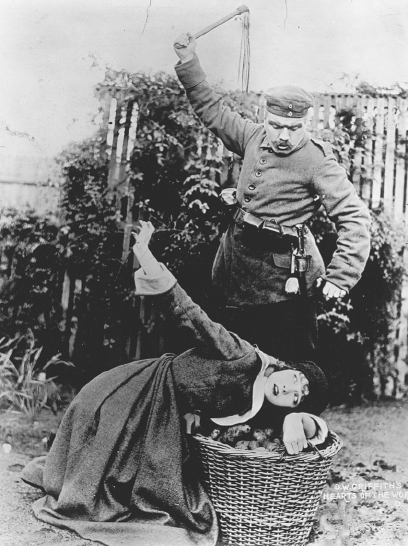Rally around the Flag — or Else
Printed Page 659
When Congress committed the nation to war, only a handful of peace advocates resisted the tide of patriotism. A group of professional women, led by settlement house leader Jane Addams and economics professor Emily Greene Balch, denounced what Addams described as “the pathetic belief in the regenerative results of war.” After America entered the conflict, advocates for peace were labeled cowards and traitors.
To suppress criticism of the war, Wilson stirred up patriotic fervor. In 1917, the president created the Committee on Public Information under the direction of George Creel. Creel sent “Four-Minute Men,” a squad of 75,000 volunteers, around the country to give brief pep talks that celebrated successes on the battlefields and in the factories. Posters, pamphlets, and cartoons depicted brave American soldiers and sailors defending freedom and democracy against the evil “Huns,” the derogatory nickname applied to German soldiers.
America rallied around Creel’s campaign. The film industry cranked out pro-war melodramas and taught audiences to hiss at the German kaiser. Colleges and universities generated war propaganda in the guise of scholarship. When Professor James McKeen Cattell of Columbia University urged that America seek peace with Germany short of victory, university president Nicholas Murray Butler fired him on the grounds that “what had been folly is now treason.”
A firestorm of anti-German passion erupted. Across the nation, “100% American” campaigns enlisted ordinary people to sniff out disloyalty. German, the most widely taught foreign language in 1914, practically disappeared from the nation’s schools. Targeting German-born Americans, the Saturday Evening Post declared that it was time to rid the country of “the scum of the melting pot.” Anti-German action reached its extreme with the lynching of Robert Prager, a German-born baker with socialist leanings. Persuaded by the defense lawyer who praised what he called a “patriotic murder,” the jury at the trial of the killers took only twenty-five minutes to acquit.

As hysteria increased, the campaign reached absurd levels. Menus across the nation changed German toast to French toast and sauerkraut to liberty cabbage. In Milwaukee, vigilantes mounted a machine gun outside the Pabst Theater to prevent the staging of Schiller’s Wilhelm Tell, a powerful protest against tyranny. The fiancée of one of the war’s leading critics, caught dancing on the dunes of Cape Cod, was held on suspicion of signaling to German submarines.
CHAPTER LOCATOR
What was Woodrow Wilson’s foreign policy agenda?
What role did the United States play in World War I?
What impact did the war have on the home front?
What part did Woodrow Wilson play at the Paris peace conference?
Why was America’s transition from war to peace so turbulent?
Conclusion: What was the domestic cost of foreign victory?
 LearningCurve
LearningCurve
Check what you know.
The Wilson administration’s zeal in suppressing dissent contrasted sharply with its war aims of defending democracy. In the name of self-defense, the Espionage Act (June 1917), the Trading with the Enemy Act (October 1917), and the Sedition Act (May 1918) gave the government sweeping powers to punish any opinion or activity it considered “disloyal, profane, scurrilous, or abusive.” When Postmaster General Albert Burleson blocked mailing privileges for dissenting publications, dozens of journals were forced to close down. Of the 1,500 individuals eventually charged with sedition, all but a dozen had merely spoken words the government found objectionable. One of them was Eugene V. Debs, the leader of the Socialist Party, who was convicted under the Espionage Act for speeches condemning the war as a capitalist plot and sent to the Atlanta penitentiary.
The president hoped that national commitment to the war would silence partisan politics, but his Republican rivals used the war as a weapon against the Democrats. The trick was to oppose Wilson’s conduct of the war but not the war itself. Republicans outshouted Wilson on the nation’s need to mobilize for war but then complained that Wilson’s War Industries Board was a tyrannical agency that crushed free enterprise. As the war progressed, Republicans gathered power against the Democrats, who had narrowly reelected Wilson in 1916.
In 1918, Republicans gained a narrow majority in both the House and the Senate. The end of Democratic control of Congress not only halted further domestic reform but also meant that the United States would advance toward military victory in Europe with political power divided between a Democratic president and a Republican Congress likely to challenge Wilson’s plans for international cooperation.
QUICK REVIEW
Question
How did progressive ideals fare during wartime?